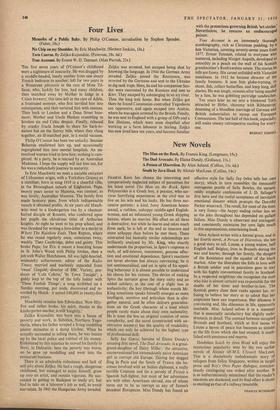Four Lives
Memoirs of a Public Baby. By Philip O'Connor, introduction by (Faber, 18s.)
Stephen Spender.
True Account. By Ernest W. D. Tennant. (Max Parrish, 21s.) THE first seven years of O'Connor's childhood were a nightmare of insecurity. He was dragged by a muddle-headed, lonely mother from one sleazy French bedroom to another; left for two years in a Wimereux patisserie in the care of Mme Til- lieux, who, luckily for him, had many children, then snatched away by Mother to lodge in a Calais brewery; this time left in the care of Adele, a frustrated monster, who first terrified him into constipation, and then tortured him with enemas. Then back to London and a Dean Street base- ment; Mother and Uncle Haslem crumbling in loveless sin and Celtic despair. Finally, released by cranky Uncle Joseph to share his back-to- nature but on the Surrey hills, where they clung together, an ill-matched pair, in a social vacuum.
Philip O'Connor has been too unlucky. Seamier Bohemia swallowed him up, and occasionally regurgitated him into mental hospitals. An un- resolved woman tried to love him; nothing is com- pleted. At a party, he is rescued by an Australian Madonna. I hope the supply will last him out, for his was a melancholy journey to maturity.
In Eric Maschwitz we meet a sociable extravert of Lithuanian origin, with a Yorkshire Granny as a stabiliser, born in snug 1910 in a cheerful villa, in the Birmingham suburb of Edgbaston. Papa, twenty years senior to Mamma, was content; as was lovely, Australian Mamma. The family firm made lavatory pans, from which indispensable vessels it obtained profits. At six years old Masch- witz went to a kindergarten run by a chestnut- haired disciple of Rossetti, who conferred upon her pupils the chivalrous titles of Arthurian knights. At eight he went to his prep school, and was thrashed for writing a love-letter to a starlet in Where The Rainbow Ends. Then Repton, where he was caned regularly once, sometimes twice, weekly. Then Cambridge, debts and gaiety. This broke Papa; for Eric it meant a boarding house in St. John's Wood with Philip Jordan, then a job with Walter Hutchinson. All was light-hearted, unpanicky achievement; editor of the Radio Times; married and tearlessly separated from `sweet' Gingold; director of BBC Variety, pro- ducer of 'Cafe Colette,' In Town Tonight'; a giddy leap to the top of the lolly ladder with `These Foolish Things'; a song scribbled on a Sunday morning, put aside, discovered and re- corded by Hutch: it netted £40,000 in twenty-five years.
Maschwitz remains late Edwardian. Now fifty- five and rather broke, his spirit, thanks to the kindergarten teacher, is still 'knightly.'
Zeljko Kujundzic was born into a house of poverty and work, in Subotica, Northern Yugo- slavia, where his father scraped a living modelling plaster statuettes in a damp kitchen. When he actually succeeded in selling them, he was beaten up by the local police and robbed of his money. Embittered by this injustice he moved his family to Novi, in Dalmatia; here the poverty was worse, so he gave up modelling and went into the restaurant business.
There is an admirable robustness and lack of self-pity about Zeljko. He had a rough, dangerous childhood, but managed to enjoy himself, grow up into an artist, and remain vigorous. He suc- ceeded in getting to Budapest to study art, but had to take on a labourer's job as well, to avoid starvation. In 1941 the Hungarian Army invaded. Zeljko was arrested, but escaped being shot by knowing the language. In 1944 the German Army invaded. Zeljko joined the Resistance, was arrested by the Germans and sent to the Ukraine to dig tank traps. Here, he and his companion San- dor were rearrested by the Russians and sent to Kiev. They escaped by submerging in an icy river. Then the long trek home. But when Zeljko got there he found Communist-controlled Yugoslavia too oppressive, and again escaped into Austria, where he was again arrested by the British. Finally, he was sent to England with a group of DPs and a few illusions, which were soon dispelled after working as a farm labourer in Stirling. Zeljko has now lived here ten years, and become familiar
• with the pretentions governing British 'art circles Nevertheless, he remains an undiscourages painter.
True Account is an immensely thorough autobiography, rich as Christmas pudding, by s late Victorian, covering seventy-seven years from 1877. Ernest Tennant, related to everyone who mattered, including Margot Asquith, developed as smoothly as a peach on the wall of his Scottish grandmother's Renfrewshire estate. The stories he tells are funny. His career unfolded with Victorian stateliness. In 1912 he became director of the family business. It sent him globe-trotting, 10 shoot, fish, collect butterflies, and keep long, dull diaries. He was tough; minutes after being mauled by a lion, he was gobbling partridge sandwiches Ten years later he set into a blinkered Tory, attracted to Hitler, chummy with Ribbentrop; dreaming of a bloodless marriage of German and British industrialists to stamp out European Communism. The last half of this book, especially, will make uneasy retrospective reading for every. one.
BRIDGETTISDALI






































 Previous page
Previous page